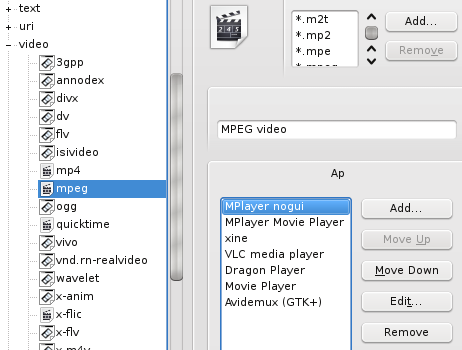So everyone knows KDE is a mammoth. And that it's very configurable. The problem is when you have to configure something for which there isn't a gui. For all I know, KDE's system of config files is completely sane and reasonable, but as a user I've never known how to understand it or where to read the explanation.
One thing that has always annoyed me across operating systems is mime types/file associations. You need some kind of mapping between file types and associated applications, and it always ends up being a kind of registry that's a pain to maintain. KDE is like that too.

Here's what I've found out. The application entries that appear in that gui are defined in .desktop files that live in /usr/share/applications. So to get your app in there, you clone an existing .desktop file and edit. In my case, I like to play all video media in mplayer, the non-gui version. Because it's non-gui, it's usually not set up through the package. Instead gmplayer, which I don't want, is. So I've made my own mplayer-nogui.desktop file.
[syntax,mplayer-nogui.desktop,bash]
Now, to make your app appear under the file types you want, you just put this in the .desktop file. Once you've done that, you have a reusable mplayer-nogui.desktop that you can push into /usr/share/applications on any distro that fails to set up mplayer without a gui.
The next step is to make MPlayer nogui the preferred app for every file type that it's associated with. This is stored in ~/.kde/share/config/profilerc. The file is easy to figure out, and ideally I'd want an easy way to just select all and then override with MPlayer nogui. But to do that I'd have to write a parser, and it's frankly not worth the effort. So I just go through the list of video filetypes and manually move MPlayer nogui to the top. It would be nice to automate this.
In terms of maintenance, linux is not the jungle that Windows is, which means apps you install later won't generally try to steal the preferred status. But they might. So again, it would be nice to automate reseting that (or maybe locking down the preferences somehow).
It would be nice if the KDE guys came out with a gui that made it possible to set up your file associations in 30 seconds, but until then this is the best I got.

 November 4th, 2008
November 4th, 2008

 You might think "Hey the Dutch are nuts about biking, I bet they have great bikes over there!". You'd be wrong. The bikes in use in this country are something out of an old Soviet factory. Single speed, pedal brake, black paint (or painted a bright color to conceal rampant corrosion), with a regular chain for locking. Often you can hear them coming, wheels spinning unevenly on the axle because the rims are slightly bent, lights fastened poorly and about to fall off, crank screeching against the panel that conceals the chain. Not surprisingly, bike repair is a thriving business in this country, repair shops are everywhere.
You might think "Hey the Dutch are nuts about biking, I bet they have great bikes over there!". You'd be wrong. The bikes in use in this country are something out of an old Soviet factory. Single speed, pedal brake, black paint (or painted a bright color to conceal rampant corrosion), with a regular chain for locking. Often you can hear them coming, wheels spinning unevenly on the axle because the rims are slightly bent, lights fastened poorly and about to fall off, crank screeching against the panel that conceals the chain. Not surprisingly, bike repair is a thriving business in this country, repair shops are everywhere. Then there are the bike lanes. Yes, they are dedicated to bikes, and yes they are separate from motorized traffic. What you probably don't expect, however, is just how boring it is to ride on them. They are completely flat, they have their own traffic lights, and even indicators for traffic going in different directions. It's no wonder bikes don't have any gears, there's no way you could build up any speed before you have to stop at the next light. It is the experience of urban biking with the added bureaucracy of driving a car
Then there are the bike lanes. Yes, they are dedicated to bikes, and yes they are separate from motorized traffic. What you probably don't expect, however, is just how boring it is to ride on them. They are completely flat, they have their own traffic lights, and even indicators for traffic going in different directions. It's no wonder bikes don't have any gears, there's no way you could build up any speed before you have to stop at the next light. It is the experience of urban biking with the added bureaucracy of driving a car A conspiracy thriller with a redneck in the lead. An unusual angle, but worth a try. The story is he was a sniper in the army, then he got called in for a very special job with the FBI: to plan the assassination of the president cause they believed someone else was going to do it and they wanted him to tell them how it could be done.
A conspiracy thriller with a redneck in the lead. An unusual angle, but worth a try. The story is he was a sniper in the army, then he got called in for a very special job with the FBI: to plan the assassination of the president cause they believed someone else was going to do it and they wanted him to tell them how it could be done.